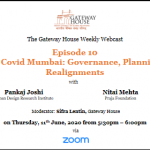The discussion addressed the concerns and issues of Post COVID Mumbai: Governance, Planning & Realignments
In this Webcast, which was recorded earlier this week (June 11), the speakers highlight four immediate COVID-19 mitigation steps for Mumbai followed by four long-term recommendations for better urban-planning and governance, by Mumbai, for future emergencies.
Immediate COVID-19 mitigation steps for Mumbai, addressed are:-
1) Numerous Fever Clinics have been opened in vulnerable pockets – slums, gaothans, koliwadas across Mumbai. These clinics are city’s first line of defense and have improved the infrastructure of the city’s primary health apparatus, which is woefully inadequate, compared to its secondary and tertiary care. These must be continued post COVID-19, not just during the monsoon months but through the year to prevent the numerous fevers that often escalate to the point of pneumonia and need hospitalization.
2) Reopening Mumbai’s local trains will require ‘staggered’ peak hours to ensure social distancing while commuting. Both state and city governments must seek the cooperation of institutions, companies, and traders etc., to stretch the current morning peak hours of 8-10 am on public transport to 6 am. This can be extended to evening peak hours as well, which will effectively reduce densities on the public transport systems.
3) With heavy demand on the BEST bus services given that local trains are still not open for all except essential workers, school buses can be pressed into service to reduce lines at bus-stops and to ensure social distancing through spaced seating. This will increase the frequency of buses and provide a faster commute for passengers.
4) Empowering local city councilors’, city officials and residents is crucial for a more targeted response at the ward level. The lack of accurate data with the state government regarding migrant workers in the city was information which local NGOs and councilors working with migrants at the grass-root level already possessed. If empowered, these individuals and institutions can help in deploying resources more accurately to fight the pandemic.
Some long-term recommendations for better urban-planning and governance, by Mumbai, for future emergencies put forward are:-
1) A permanent disaster response vertical in Municipal Corporation of Greater Mumbai (MCGR) and in other Mumbai Metropolitan Region (MMR) municipalities. This department must have a cell in every city ward.
2) Invest substantially in public primary healthcare infrastructure.
3) Rethink the paradigms of urban-planning, such as quality education, healthcare and increased per capita developed open space. Open spaces should be in line with the National Building Code of India (NBC), which recommends 3 sqm per capita as compared to greater Mumbai’s 0.9 sqm.
4) Enhance sanitation in vulnerable localities to reduce the population density at common toilets. This is even more important now since crowding in toilet lines has been one of the biggest sources of infection during the current pandemic.


